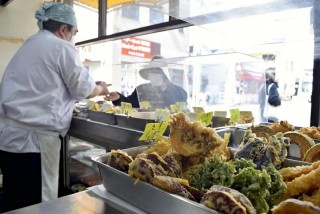Loading
Search
▼ Food Prices Rising; Inevitably To Affect Households
- Category:Other
There are no signs of a halt to the rise in food prices in Japan as the costs of raw materials soar unchecked due to pandemic-linked and weather factors.
So far, food manufacturers have largely been able to absorb these cost increases, but this has run its course. Russia’s invasion of Ukraine and sanctions against Moscow are also seen driving up the price of crude oil and gas. Thus, the burden on Japanese households is likely to become even heavier.
A 53-year-old owner of a tempura store in a shopping district in Koto Ward, Tokyo, is especially worried about the ever-rising costs to do business. The price of cooking oil has risen 20% to 30% compared with last year, and the prices of flour and packaging materials has also skyrocketed.
“We may have to consider raising prices again,” he said.
Behind this, concerns linger over global shortages of raw materials.
Soybeans, one of the raw materials for cooking oil, are under threat of production cuts in major producing countries.
Palm oil is also exposed to labor shortages on plantations in Malaysia, the main producer of palm oil, due to the pandemic.
J-Oil Mills Inc., a major cooking oil company in Japan, will raise the price of its products for home and business use — except for rapeseed oil — by more than ¥40 per kilogram starting from April 1 deliveries.
The price increases cover a wide range of food products.
Toyo Suisan Kaisha Ltd. will raise the suggested retail prices of about 220 instant noodle products in its Maruchan series by 9% to 12% starting with shipments on June 1.
Sanyo Foods Co. will raise the price of its Sapporo Ichiban Miso Ramen pouched instant noodles from ¥111 to ¥123, for shipments from June 1.
Morinaga Milk Industry Co. will raise the prices of 25 items, such as cheese for home use, by up to 10.5% for shipments from April 1.
Ajinomoto Co. will also raise the prices of 25 products, such as its Ajinomoto flavor seasoning series for home use, by about 2% to 13%.
“Further rises in food prices could cool consumer sentiment and lead to economic downturn,” said Tomohiko Kozawa, a researcher at Japan Research Institute.
So far, food manufacturers have largely been able to absorb these cost increases, but this has run its course. Russia’s invasion of Ukraine and sanctions against Moscow are also seen driving up the price of crude oil and gas. Thus, the burden on Japanese households is likely to become even heavier.
A 53-year-old owner of a tempura store in a shopping district in Koto Ward, Tokyo, is especially worried about the ever-rising costs to do business. The price of cooking oil has risen 20% to 30% compared with last year, and the prices of flour and packaging materials has also skyrocketed.
“We may have to consider raising prices again,” he said.
Behind this, concerns linger over global shortages of raw materials.
Soybeans, one of the raw materials for cooking oil, are under threat of production cuts in major producing countries.
Palm oil is also exposed to labor shortages on plantations in Malaysia, the main producer of palm oil, due to the pandemic.
J-Oil Mills Inc., a major cooking oil company in Japan, will raise the price of its products for home and business use — except for rapeseed oil — by more than ¥40 per kilogram starting from April 1 deliveries.
The price increases cover a wide range of food products.
Toyo Suisan Kaisha Ltd. will raise the suggested retail prices of about 220 instant noodle products in its Maruchan series by 9% to 12% starting with shipments on June 1.
Sanyo Foods Co. will raise the price of its Sapporo Ichiban Miso Ramen pouched instant noodles from ¥111 to ¥123, for shipments from June 1.
Morinaga Milk Industry Co. will raise the prices of 25 items, such as cheese for home use, by up to 10.5% for shipments from April 1.
Ajinomoto Co. will also raise the prices of 25 products, such as its Ajinomoto flavor seasoning series for home use, by about 2% to 13%.
“Further rises in food prices could cool consumer sentiment and lead to economic downturn,” said Tomohiko Kozawa, a researcher at Japan Research Institute.
- March 12, 2022
- Comment (0)
- Trackback(0)


